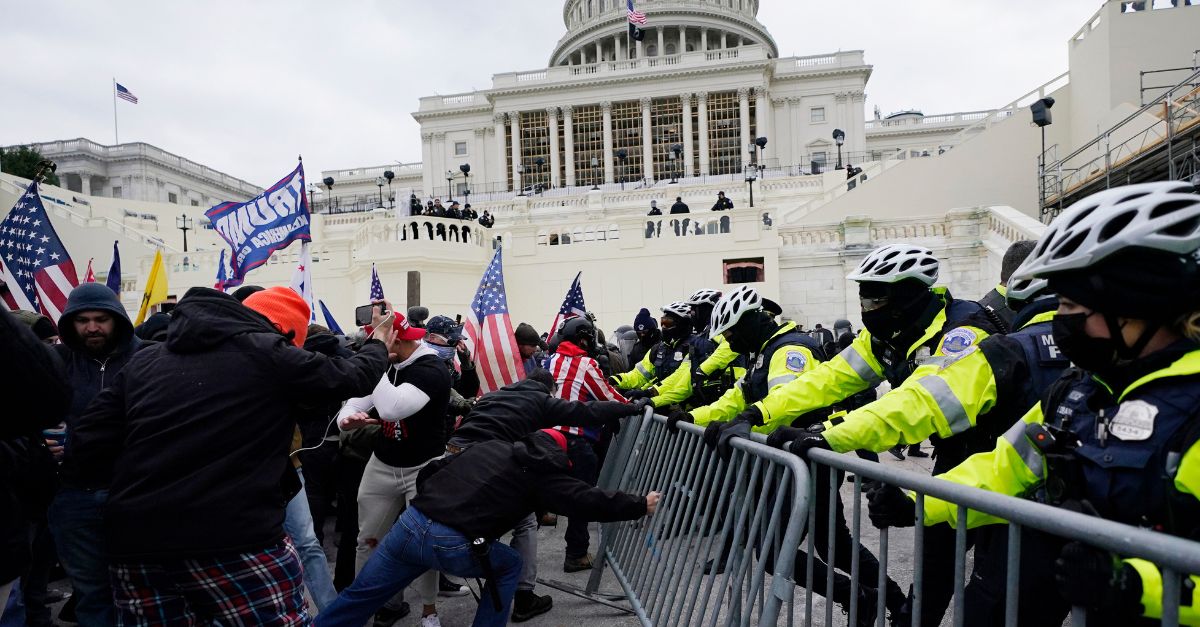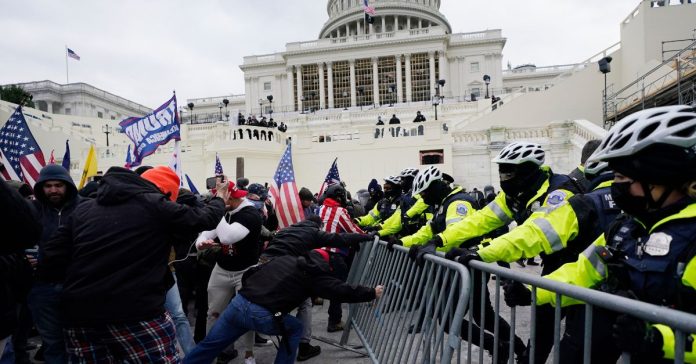
FILE – In this Jan. 6, 2021, file photo, Trump supporters try to break through a police barrier at the Capitol in Washington. (AP Photo/Julio Cortez, File)
Lawmakers and police suing Donald Trump in civil court for his alleged role in the violence of Jan. 6 told a judge that enough is enough and there is no reason why after three years that they should be forced to delay the pursuit of justice any longer — even if the former president is in the midst of pursuing answers to his claim of total immunity from criminal prosecution from the U.S. Supreme Court.
Trump begged U.S. District Judge Amit Mehta to halt all Jan. 6 civil litigation against him, as Law&Crime previously reported, just a week ago. He argued that until the Supreme Court resolved whether he had “absolute immunity” from prosecution as a former president, any attempt to make him face lawsuits even so much as tangentially related to his four felony charges in Washington, D.C., unconstitutionally threatened to expose his defense strategy when that case went to trial. At the moment, the criminal trial where he will face charges alleging he conspired to subvert the 2020 election, obstruct proceedings, defraud the United States and intimidate voters, is on hold.
That case will remain on hold until well after the Supreme Court hears oral arguments on the immunity question on the last day of its term, April 25. The justices are aware of the time constraints given that the presidential election is just a few short months after that, but even if they took the summer to resolve it, any delay is too long for the plaintiffs.
The U.S. Court of Appeals for the District of Columbia cleared a path for three Jan. 6 civil liability lawsuits to advance on March 8, finding that Trump had missed a deadline at the Supreme Court to fight them off and had failed to raise any convincing new arguments following a lower court’s decision that found U.S. Capitol Police officers’ claims in the case of Blassingame v. Trump made it clear:
Blassingame held that former President Donald J. Trump lacks presidential immunity for actions that he took ‘in his personal capacity as presidential candidate’ as opposed to ‘in his official capacity as sitting President.’
In this motion, the plaintiffs include the chairman of the now-defunct House Select Committee to Investigate the January 6th Attack on the U.S. Capitol, Rep. Bennie Thompson, D-Miss.; California Reps. Karen Bass, Barbara Lee, and Maxine Waters, all Democrats; Steve Cohen, D-Tenn.; Bonnie Watson Coleman, D-N.J.; Veronica Escobar, D-Tex.; Hank Johnson Jr., D-Ga.; Marcy Kaptur, D-Ohio; Jerry Nadler, D-N.Y.; and Pramila Jayapal, D-Wash.
“Trump now asks the Court to grant him a blanket, indefinite stay of these cases until the ultimate resolution of a criminal case that has not yet been scheduled for trial and for which appeals will likely not be resolved for years to come,” the lawmakers wrote.
He has distorted the connection between his defense for the criminal trial and the lawsuits naming him in civil matters, they claim.
Adding insult to injury, the motion highlights that when Trump’s lawyers were in civil court four months ago, the former president had a chance then to dispute any allegations that bore on the immunity question. But he didn’t make his case nor seek further review of the facts. The court had instructed the parties in December to locate any facts relevant to immunity and then prepare for a hearing where terms could be stipulated but Trump never did that, they say; he simply plowed ahead with an attempt to stop proceedings outright.
Per Tuesday’s motion:
First, the immunity inquiry at issue in these civil proceedings is limited to whether Defendant Trump’s conduct at issue falls within the scope of his official responsibilities. That question is not at issue in U.S. v. Trump. As Trump himself recognized, the question of whether his conduct falls within his official responsibilities ‘lies outside the Question Presented’ before the Supreme Court.
And questions concerning whether Trump was acting within the scope of his official responsibilities are distinct from the merits of the criminal charges he faces in U.S. v. Trump.
Accordingly, there is nothing to be gained here — other than delay — by waiting for the Supreme Court’s resolution of U.S. v. Trump.
An indefinite stay would not improve “judicial economy” either, something Trump — as well as imprisoned former Proud Boys leader and convicted seditious conspiracist Henry “Enrique” Tarrio — latched onto in recent days. Tarrio, the extremist Proud Boys organization and the Oath Keepers organization are also named in many lawsuits involving Jan. 6 but notably, Tarrio has aligned himself with Trump on immunity despite admitting he has no dog in the fight.
When Trump faces criminal trial on his election interference charges before U.S. District Judge Tanya Chutkan, the case will not turn on whether he acted within the scope of his official responsibilities, the lawmakers said Tuesday.
Therefore, if Trump is going to continue to pursue immunity as a defense, he should be required to “identify the contours of that defense so that the parties and the Court can determine what if any limited discovery is needed,” the lawmakers wrote.
The former president’s contention that he would suffer infringement on his right to remain silent under the Fifth Amendment are untrue as well, they argue, and if he wants to advance that claim, he should be forced to elaborate on it further since his previous motion was too vague on this front.
The court has the power to create “guardrails” that are case-specific to protect defendants from saying anything incriminating. If the parties could come up with a “tailored” discovery process, then that would mean the civil litigants’ own rights to a just and speedy trial wouldn’t be violated.
“Defendant Trump has exhausted all avenues of appeal related to presidential immunity from damages liability. He must now be required to bear his burden on his immunity defense or let this case proceed to the merits,” the plaintiffs wrote.
The lawmakers say they are also concerned that Trump may take steps to conceal or destroy nonpublic evidence as it pertains to their claims.
“Trump’s propensity for purging evidence against him has been widely covered in the media. For any evidence relevant to Trump’s immunity claim that may be in his possession, each day of the requested stay would present another opportunity for spoliation,” the motion states.
Notably, court records show lawyers for the parties were supposed to meet on March 6 to discuss the immunity guardrails, but a day before the anticipated meeting, Trump’s lawyers said they would not meet and, further, would not agree to any stipulations going forward. Trump’s lawyers doubled down on this position at a status conference held on March 12, the plaintiffs note. It was during that six-day span that the Washington, D.C., appeals court approved civil litigation from police officers in the cases of Marcos J. Moore v. Donald Trump, Bobby Tabron et al v. Donald Trump, and Briana Kirkland v. Donald Trump.
Mutually but in their own separate motions, the plaintiffs argued that Trump had broken the Ku Klux Klan Act of 1871. That law bars mob violence from being directed at federal officials. Many of the officers also allege that Trump inflicted physical and emotional injuries on them by inciting the attack at the Capitol.
Attorneys for the parties did not immediately respond to a request for comment Wednesday.
Have a tip we should know? [email protected]

